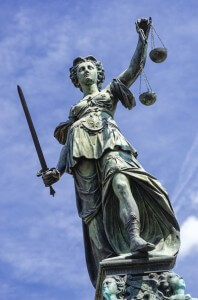The New Religious Freedom Riddle: When does one liberty trump another?
May 15th, 2015
 In the beginning, the answer was simple; there was almost no situation in which someone else’s actions were intended to be allowed to impede upon another citizen’s unalienable rights. That guarantee came with a caveat, however, as the small print to this rule included exceptions for minorities, women and non-landholders. In fact, when the Constitution was written, slavery was still legal and making a mockery of the rights of millions of Americans every single day. As our society progressed to become more inclusive and protective of all Americans, the religious question became more complicated. Succinctly put, each and every American has the rights laid out by the Constitution and its amendments, and those rights cannot be taken away (easily). There are situations that warrant the balancing of individual rights against what is good for society as a whole, and as modern day Americans we have become used to making these compromises without a second thought.
In the beginning, the answer was simple; there was almost no situation in which someone else’s actions were intended to be allowed to impede upon another citizen’s unalienable rights. That guarantee came with a caveat, however, as the small print to this rule included exceptions for minorities, women and non-landholders. In fact, when the Constitution was written, slavery was still legal and making a mockery of the rights of millions of Americans every single day. As our society progressed to become more inclusive and protective of all Americans, the religious question became more complicated. Succinctly put, each and every American has the rights laid out by the Constitution and its amendments, and those rights cannot be taken away (easily). There are situations that warrant the balancing of individual rights against what is good for society as a whole, and as modern day Americans we have become used to making these compromises without a second thought.
Religious Freedom Protection Laws
It is for this reason that when a State creates a law that seems to ‘play favorites’ with one Constitutional protection over another, we as citizens take notice. It may be surprising to some that new laws are needed when it comes to protecting the right to practice, or not to practice, a particular religion. It seems odd to many individuals who may be hearing about the need for these laws for the first time because of the actions of lawmakers across the country.
It could be argued that religious freedom is one that which the federal government has largely left alone since its inception in the original Bill of Rights as there has never been a formal “American religion” or any other mandate that would require citizens to hold a certain set of beliefs over another. Others argue, however, that recent enforcement actions against American businesses has shown a rising need for such legislation as the business owners’ beliefs should, and be allowed to, permeate into their working environment. It is for the benefit of this latter group that legislators in states such as Indiana, Arkansas, Arizona and Michigan decided to craft and send to the Governor various versions of “religious freedom laws”, with a varying degree of success. Most recently, Indiana’s law was passed and signed by the governor to the fanfare of much protesting and convention business lost.
In the Name of Clarification
Clarifying a law after it has been passed is more common than the general population is probably aware, and is done for a myriad of reasons. In the case of Indiana’s new law, the Governor has asked that the law be clarified to address concerns about its potential for use as a weapon rather than its intended shielding purpose. Laws such as this, purporting to protect a specific constitutional right, must be balanced against their use by some to trample those rights which are not named in the law. Whether the law needs clarification or outright repeal is a matter for lawmakers and politicians, but whichever way this law’s journey goes the Universal Life Church will monitor it and all other states that wish to play favorites with one Constitutional protection over another.


